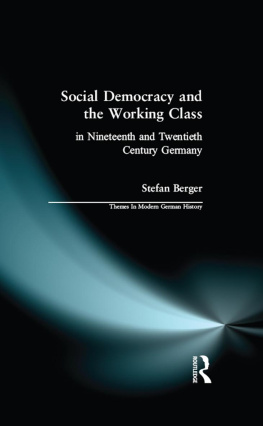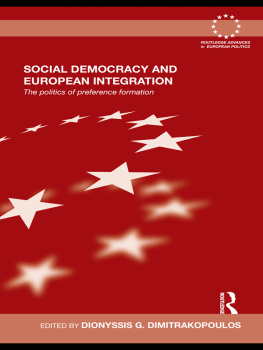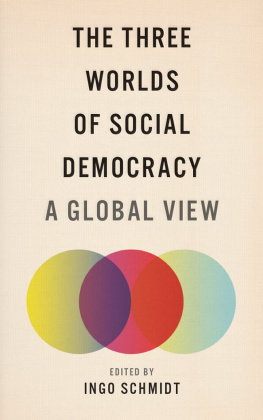In the Name of
Social Democracy
The Great Transformation,
1945 to the Present

GERASSIMOS MOSCHONAS
Translated by Gregory Elliott

This book is supported by the French Ministry for Foreign Affairs as part of
the Burgess Programme, headed for the French Embassy in London by
the Institut Franais du Royaume Uni
 institut franais
institut franais
This edition (revised and updated from the French original)
first published by Verso 2002
Verso 2002
Translation Gregory Elliott 2001
First published as La social-dmocratie de 1945 nos jours
Montchrestien, E.J.A. 1994
All rights reserved
The moral rights of the author and the translator have been asserted
1 3 5 7 9 10 8 6 4 2
Verso
UK: 6 Meard Street, London W1F 0EG
US: 20 Jay Street, Suite 1010, Brooklyn, NY 11201
www.versobooks.com
Verso is the imprint of New Left Books
ISBN-13: 978-1-85984-346-8 (PB)
ISBN-13: 978-1-78478-797-4 (US EBK)
ISBN-13: 978-1-78478-796-7 (UK EBK)
British Library Cataloguing in Publication Data
A catalogue record for this book is available from the British Library
Library of Congress Cataloging-in-Publication Data
A catalog record for this book is available from the Library of Congress
Society must be understood starting from its weakest link.
(Jean-Paul Fitoussi and Pierre Rosanvallon,
Le nouvel ge des ingalits)
Reform can best be made effective and durable when tactics are able to link the interests and fate of the poor with the fortunes of the better-off not ethics, but politics explains it.
(Peter Baldwin, The Politics of Social Solidarity)
Contents
| CDU | Christlich Demokratische Union (German Christian Democratic Party) |
| CPS | Confederation of Socialist Parties of the European Community |
| DC | Democrazia Christiana (Italian Christian Democratic Party) |
| DNA | Det Norske Arbeiderparti (Norwegian Labour Party) |
| EPP | European Peoples Party |
| FDP | Freie Demokratische Partei (German Free Democratic Party) |
| FN | Front National (France) |
| FP | Freiheitliche Partei sterreichs (Austrian Freedom Party) |
| IU | Izquierda Unida (United Left, Spain) |
| KKE | Kommounistiko Komma Elladas (Greek Communist Party) |
| VP | sterreichs Volkspartei (Austrian Peoples Party) |
| PASOK | Panellinio Sosialistiko Kinima (Pan-Hellenic Socialist Movement) |
| PCF | Parti Communiste Franais (French Communist Party) |
| PCI | Partito Comunista Italiano (Italian Communist Party) |
| PDS | Partei des Demokratischen Socialismus (Democratic Socialist Party, Germany) |
| PDS | Partito Democratico della Sinistra (Democratic Party of the Left, Italy) |
| PES | Party of European Socialists |
| PS | Parti Socialiste (Socialist Party, France) |
| PSB | Parti Socialiste Belge (Belgian Socialist Party) |
| PSI | Partito Socialista Italiano (Italian Socialist Party) |
| PSOE | Partido Socialista Obrero Espaol (Spanish Socialist Workers Party) |
| PSP | Partido Socialista Portugus (Portuguese Socialist Party) |
| PvdA | Partij van de Arbeid (Labour Party, Holland) |
| SAP | Social demokratiska Arbetarepartiet (Swedish Social-Democratic Party) |
| SD | Social demokratiet (Danish Social-Democratic Party) |
| SF | Socialistik Folkeparti (Socialist Peoples Party, Denmark) |
| SFIO | Section Franaise de lInternationale Ouvrire (France) |
| SPD | Sozialdemokratische Partei Deutschlands (German Social-Democratic Party) |
| SP | Sozialistische Partei sterreichs (Austrian Socialist Party, Austrian Social-Democratic Party since 1991) |
A first version of this book was published in France in 1994 by Montchrestien as La Social-dmocratie de 1945 nos jours. The original ambition of the English edition was to offer an updated translation of it. But as work progressed, that objective underwent significant alteration, and I have expanded my horizons considerably. It is always in the act of writing that a book is produced and, at the same time, transformed and unveiled. In truth, the present work is new and different, but the themes and problematic it develops are very closely related to those presented more succinctly in the French. While there is no need for the reader to refer to it, it is worth indicating that the French text is not simply a shorter version of the current work, although it is that too.
Six years later, the change in social democracy has become the focal point of our analysis. The present study does still seek to provide an overview of the evolution of social democracy, particularly since the Second World War, but the main emphasis is on social democracy today on what (to adopt Karl Polanyis well-known phrase) we regard as a great transformation. Although the foundations and reference points on which the historical social-democratic movement was constructed are neither totally shaken nor eroded, social democracy is living through a change of epoch. This explains the books subtitle.
The constraints inherent in any publication have obliged me to disaggregate certain aspects of the social-democratic phenomenon for the purposes of examining them more closely. I have therefore set aside a detailed study of socialism in southern Europe something undertaken, in succinct but incomplete fashion, in the French edition (a very detailed examination of the French case was the subject of my doctoral thesis in 1990). This basic choice derived from a concern not to exceed the stipulated word length. But another reason informed my decision and explains this lacuna, which is unquestionably a major one. Although they belong to the same great European socialist/social-democratic family, the parties of southern Europe are less and less strictly tied as political forms to the binary opposition between the social-democratic and the non-social-democratic. In and through a dual dynamic of convergence, the socialisms of the south are converging with the more classical social democracies, which are themselves undergoing de-social-democratization. The effect is to reduce the old contrasts and narrow the gaps characteristic of a still recent past. Thus, the opposition between southern socialism and more classical social democracy (conceived as an opposition between logical types) is in part-but only in part diluted. Apart from the space constraints on an already long book, this is the main reason for not examining southern European socialism in detail.
















 institut franais
institut franais